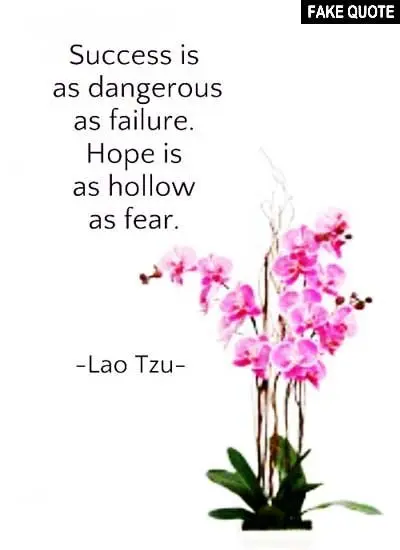Fake Lao Tzu Quote
"Success is as dangerous..."

This is NOT a quote from Tao Te Ching:
"Success is as dangerous as failure. Hope is as hollow as fear."
The Book
The Taoism of Lao Tzu Explained. The great Taoist philosophy classic by Lao Tzu translated, and each of the 81 chapters extensively commented. Click the image to see the book at Amazon (paid link).
More about the book here.
|
This quote makes sense and it is similar to statements made in Tao Te Ching. That is no wonder, since it is Stephen Mitchell's 1988 version of the first lines of chapter 13.
The problem is that Lao Tzu's text discusses other aspects than Mitchell's wording implies, mainly those of fear and vulnerability. Here is my version of the same lines:
Praise and disgrace cause fear.
Honor and great distress are like the body.
Arthur Waley's version from 1934 reads (page 157):
Favour and disgrace goad as it were to madness; high rank hurts keenly as our bodies hurt.
D. C. Lau in 1963 wrote (page 69):
Favour and disgrace are things that startle;
High rank is, like one's body, a source of great trouble.
|
90 of the most spread false Lao Tzu quotes, why they are false and where they are really from. Book by Stefan Stenudd. Click the image to see the book at Amazon (paid link).
More about the book here.
|
Mitchell's interpretation of the first sentence is well within the possible, even elegantly so. His second sentence, though, has replaced the link to bodily vulnerability with a perspective on hope and fear that denounces both. That is questionable, indeed, and has no base in Lao Tzu's thoughts — at least not in this chapter.
Chapter 13 goes on explaining what these statements mean, but that is treated in my chapter Hope and fear are both phantoms, which deals with Mitchell's version of other lines in this same Tao Te Ching chapter.
The only reason I at all treat this quote separately is the fact that it appears as such in books and on the web.
For more about Stephen Mitchell and his version of Tao Te Ching, see the chapter A good traveler has no fixed plans.
Stefan Stenudd
September 20, 2020.
There are many more fake Lao Tzu quotes examined on this website.
Click the header to see a list of them.
Click the header to read a "fake" interview with Stefan Stenudd, the author of
Fake Lao Tzu Quotes.
My Taoism Books
Click the image to see the book at Amazon (paid link).
The Taoism of Lao Tzu Explained. The great Taoist philosophy classic by Lao Tzu translated, and each of the 81 chapters extensively commented.
More about the book here.
The Ancient Wisdom of the Tao Te Ching by Lao Tzu. 389 quotes from the foremost Taoist classic, divided into 51 prominent topics. Click the image to see the book at Amazon (paid link).
More about the book here.
Erroneous Tao Te Ching Citations Examined. 90 of the most spread false Lao Tzu quotes, why they are false and where they are really from. Click the image to see the book at Amazon (paid link).
More about the book here.
|
My Other Websites:
The 64 hexagrams of the Chinese classic
I Ching and what they mean in divination. Try it online for free.
The ancient Chinese life energy
qi (
chi) explained, with simple instructions on how to exercise it.
The many ancient and modern life force beliefs all over the world explained and compared.
Other Books by Stefan Stenudd
Click the image to see the book at Amazon (paid link).
The Greek philosophers and what they thought about cosmology, myth, and the gods.
The life energy
qi (also
chi or
ki) explained, with exercises on how to awaken, increase and use it.
Basic concepts of the peaceful martial art. Aikido principles, philosophy, and fundamental ideas.
Qi, prana, spirit, ruach, pneuma, and many other life forces around the world explained and compared.
Jungian theories on myth and religion examined, from Carl G. Jung to Jordan B. Peterson.
About me
I'm a Swedish author and aikido instructor. In addition to fiction, I've written books about Taoism and other East Asian traditions. I'm also an historian of ideas, researching ancient thought and mythology. Click the image to get to my personal website.

 Tao Te Ching
Tao Te Ching Now it's a book, too!
Now it's a book, too! Tao Quotes
Tao Quotes Cosmos of the Ancients
Cosmos of the Ancients Qi — Increase Your Life Energy
Qi — Increase Your Life Energy Aikido Principles
Aikido Principles Life Energy Encyclopedia
Life Energy Encyclopedia Archetypes of Mythology
Archetypes of Mythology Stefan Stenudd
Stefan Stenudd